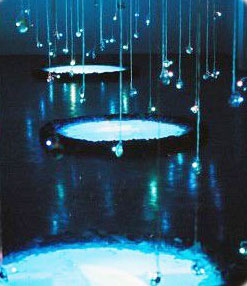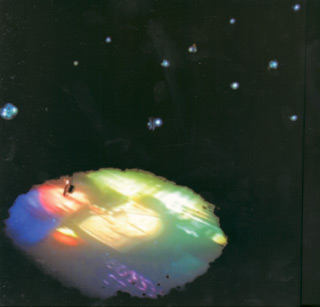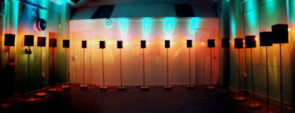| Visual Arts | U.K. | ||||||||||||||||||||||||||||||||||||||||||||||
BAFA © 2010. All material here is copyrighted. See conditions above. |
Geoff Broadway interactive media, |
 | "Imagining what it is like to be somebody other than yourself is the core of our humanity. It is the essence of compassion and the beginning of morality" Ian McEwan |
The Elders, interactive installation by Geoff Broadway. 18 speakers stand in a circle in a darkened room. Through these speakers 18 individuals over the age of 60 speak talk, both in turn and together, of things that matter to them, reflecting upon lived experience, weighing up the most important things about their life. As each person speaks, a blue halogen light attached the rear of each speaker responds to their voice, creating a spectral interplay of projected light. The voices interleave with shifting layers of ambient sounds that continually fluctuate in their intensity as they shift around the installation. Produced by Geoff Broadway while Artist in Residence |
The Elders, interactive installation by Geoff Broadway.
See Geoff's website |
| at Jubilee Arts in Birmingham, 2001-03. where do i go from here? An installation by Geoff Broadway |  |
 where do i go from here?, 2000 - 1, installation by Geoff Broadway while artist-in-residence at Durham Cathedral, U.K. | 60 suspended speakers, each with a tiny blue light attached, surround three pools of water that are lined with broken slate. In the pools a video image, depicting elements of the social and urban landscape of northeast England, is intermittently projected, while the space itself fluctuates with the murmur of voices and sparse abstract sounds. The voices are those of refugees and asylum seekers, currently living in the UK, who are telling their thoughts and experiences- communicating their own
personal view on life. Excerpts from an essay about this installation by Mark Robinson Two sample headlines from the front pages of the Daily Express during the last few days: 'ASYLUM: WE ARE BEING INVADED', and 'REFUGEES: FLEE FOR YOUR LIVES'. I didn't read any further... ...Far from creating art in a protected cloister at Durham Cathedral, Geoff Broadway has found himself reinventing the residency as something if not on the front line, then at least somewhere in the war zone, with himself a kind of the war artist or reporter gathering and manipulating stories and |
images. Stemming from his discovery of a 12th Century Knocker which could be used to request sanctuary for up to 40 days, (no one was refused, all had to give up their own clothes and stay within rooms at the Cathedral) he has looked outwards from the Durham Peninsula at one of the most pressing changes in local life since the closure of the pits: the dispersal to the North East of a growing number of asylum seekers and refugees from some of the many troubled parts of the world: Kurdistan, Afghanistan, Sudan, Iraq, Zimbabwe, Bosnia, Croatia. The week after an Iraqi Kurd had been murdered in Glasgow, and after reading those headlines, listening to a rough cut of the voices heard in this exhibition was a sobering, humbling and uncomfortable experience. I suspect it will be likewise for those visiting this exhibition...
 ...These are people whose land has been taken from them, and who are expressing themselves in a foreign tongue. Their comments thus become fascinatingly paradoxical: at once na´ve in their expression, and thus 'sincere', the haltingness of the English adding extra layers of poignancy (perhaps unwanted layers), but also artificial and constructed in a way mother-tongue testimony might not be. Although the individuals here speak passionately, bitterness is only apparent in one or two: those whose English is most impressive. It is as if the control of language allows for this expression, this emotion; as if a more rudimentary facility somehow keeps those negative emotions in check, or merely from being expressed or heard. Of course, much of the testimony betrays the wordless fear and loss that night and silence bring. Broadway's installation, poised on the cusp of dark and light, silence and confession or testimony, is an eloquent evocation of the hope and despair implicit in the double-edged concept of refuge...
...These are people whose land has been taken from them, and who are expressing themselves in a foreign tongue. Their comments thus become fascinatingly paradoxical: at once na´ve in their expression, and thus 'sincere', the haltingness of the English adding extra layers of poignancy (perhaps unwanted layers), but also artificial and constructed in a way mother-tongue testimony might not be. Although the individuals here speak passionately, bitterness is only apparent in one or two: those whose English is most impressive. It is as if the control of language allows for this expression, this emotion; as if a more rudimentary facility somehow keeps those negative emotions in check, or merely from being expressed or heard. Of course, much of the testimony betrays the wordless fear and loss that night and silence bring. Broadway's installation, poised on the cusp of dark and light, silence and confession or testimony, is an eloquent evocation of the hope and despair implicit in the double-edged concept of refuge...
. ...This is a highly wrought piece of work, despite the rawness of the tales which can be heard. It is concerned with the creation of beauty, with, therefore an aesthetic of pleasure and sensuality rather than a simplistically mimetic one of dislocation and anguish. This seeming contradiction bothers Broadway, makes him uneasy about exploiting people who are now his friends, but he is ultimately not prepared, as an artist, to give up striving for harmony within the experiences shared with him. He does this by putting aside straight realism or documentary for something more exploratory, juxtaposing words and images within a contemplative setting which demands both physical and emotional commitment from the audience. Much of our reaction to the 'problem' of asylum seekers stems from an ignorance which this work may do a little to combat. Its chances of doing that rest, I think, not on the testimony of the voices you will hear, affecting as that is, but on your willingness to kneel or crouch low enough to let stories be whispered into your ear in the dark, and to look at the sea and the sand and the sky projected upon the water, and your ability to imagine that this is both a mirror (refocus: you can see yourself, and the night sky of exile behind you) and a wishing well. This contemplation is your only place of refuge, of appeal. This is not a sensationalist work, or a liberal work appealing for special treatment, it is essentially a tool of compassion, of feeling with, made for feeling with. This is the sense in which Broadway's nervousness about his own political agenda is resolved, and what makes this a truly suitable work to emerge from a residency at Durham Cathedral. If the World Heritage Site of which the Cathedral is the centre means anything it must surely include a link back to the traditions of shelter, succour and compassion which Broadway identified in the Cathedral's Sanctuary Knocker. The North East must, whether it relishes the prospect or not, find ways in which to continue this tradition in the 21st century, rather than similarly ancient strains of ignorant intolerance." Mark Robinson Head of Film, Media & Literature, Northern Arts Read the full essay here: www.intentional.co.uk/where/intropage.html |
|
Arts Dialogue, Dintel 20, NL 7333 MC, Apeldoorn, The Netherlands email: bafa@bahai-library.com |
